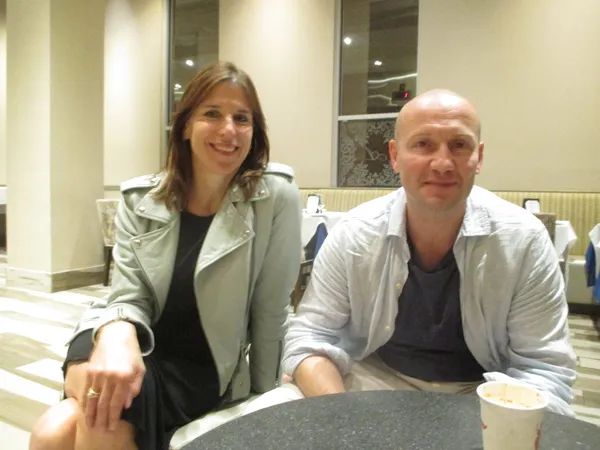Kirill Mikhanovsky and Alice Austen joined me in New York for an in-depth conversation on their madcap adventure Give Me Liberty, shot by Wyatt Garfield (Kent Jones's Diane), starring Chris Galust, Maxim Stoyanov, and Lauren 'Lolo' Spencer, with Arkady Basin, Zoya Makhlina, Darya Ekamasova, Sheryl Sims-Daniels, Atavia Gold Star, Steve Wolski, and Josette Daniels.
 |
| Lolo Spencer in New York for Give Me Liberty Photo: Anne-Katrin Titze |
We discussed how Maxim Stoyanov kept saying "Leonardo DiCaprio dies at the end of Titanic!", the evolution of the screenplay, Karl Ove Knausgaard and Alexis de Tocqueville, the determination it took to make Give Me Liberty, and their upcoming film Coming To You, supported by the Sundance Institute, currently in post-production at Skywalker Sound.
Anne-Katrin Titze: Moving people and moving furniture is so much part of the history of cinema. Pianos especially. The piano isn't being moved in your film, but about everything else is.
Alice Austen: Had we been able to do that, I think we would have done it in a heartbeat. But we were on borrowed time in that condominium.
Kirill Mikhanovsky: We did not get the permission to do it.
AA: We were actually sneaking the camera in the window of the condo of the woman who lives there.
KM: The mother of Victor, the actress [Zoya Makhlina], that's her apartment. Actually the piano was moved. She has two pianos. One is Petrof, which is a great-sounding instrument, of course.
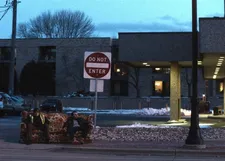 |
| Kirill Mikhanovsky on Vic (Chris Galust) with Dima (Maxim Stoyanov): "The couch and the mattress, they were pretty much in every version of the script." |
AA: And a Steinway. Grand.
KM: But not a grand Grand. It's like a Baby Grand. But it's fairly large for that small apartment.
AA: We did move it.
KM: It was smack in the middle of the room. And we suggested why don't we move it a little to the side of the room? She was so against it. But once it was there, she actually fell in love with it.
AKT: The moving of large objects, the mattress, later the couch, was that present at the beginning? At the core of structuring the film?
KM: The couch and the mattress, they were pretty much in every version of the script.
AKT: There is a lovely doubling for the two people.
KM: We were not looking for symbolism but it just so happened. There's two different families.
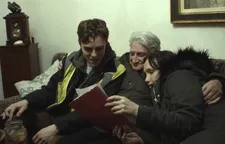 |
| Vic (Chris Galust) with his grandfather (Arkady Basin) and sister Sasha (Darya Ekamasova) |
AKT: We meet both mothers [Tracy's mom, played by Sheryl Sims-Daniels and Vic's mom].
KM: It's nice the way they echo each other without being too on the nose. There is a Noah's Ark theme in the film in the form of the van, but it's not literally.
AA: We all live in the van and this is how we survive, by being together. And you can read all kinds of things into the film, but we didn't write it into the film actually. We wrote it and then those things emerged. I think that happens with work that's really authentic somehow. That you don't have to work hard to bring symbolism to it.
AKT: The cinematography is by Wyatt Garfield, who also did Kent Jones's Diane.
AA: Yes, exactly.
AKT: He doesn't make symbolism very obvious, not at all. The scene that really got me, when I knew I was watching something brilliant, was when Dima [Maxim Stoyanov] takes the newspaper and rolls it into a cone and fills it with the chicken - chaos around him - to take it as a snack to the funeral. Where do moments like this come from between the two of you?
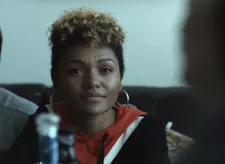 |
| Tracy's (Lolo Spencer) family is chaotic in its own way, she tries to keep calm in the immense mayhem surrounding her - which isn't easy. |
KM: Cone is directing. Chicken is directing. But there was a script. Alice and I worked on it for three years. The first iteration of the script was an eight or ten day action. It was a totally different film.
AA: We had two sets of gangsters. It was wild. It was a wild script compared to this one.
KM: As we were looking for money we kept revising the script. Then came a time when we put it aside and made another film in nine days. It's a feature film, it's a mystical thriller. It's in post-production.
AKT: What is it called?
AA: It's called Coming To You, supported by the Sundance Institute for post-production and Skywalker Sound for the post-production.
KM: And then Give Me Liberty had a comeback because someone in New York saw the script, read it, fell in love with the material. We met and they introduced us to investors and distributors here in New York. Then Alice gave it a major re-write, turning the eight, ten day structure into one day.
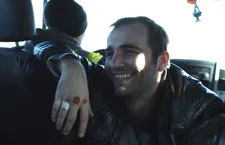 |
| Along for the ride is Dima (Maxim Stoyanov), who is as big a liar as he is a flirt and a chicken aficionado |
AKT: It's interesting that you could take all these days and put them into one.
KM: Dima died during the protests.
AA: The guy who plays Dima had read one of the early versions where he died. And he spent the whole shoot trying to convince us to let him die. He kept saying "Leonardo DiCaprio dies at the end of Titanic!" And we said "But that would be Chris [Galust], that would be Vic!"
KM: So there was a script, but things like chicken, like cones, like dumbbells - this is directed.
AA: In fact, at one point we had producing partners who were the wrong fit and they nearly tanked the film. It was a catastrophe. When I knew it was really a disaster was when they started giving bad creative notes.
AKT: For instance?
AA: One of the notes was, "Can Dima please not pick up the chicken and take a bite" on page whatever in the script. And I read that note and I felt this cold chill, thinking: Do they have any idea what Kirill is going to do with the chicken? This will be a catastrophe on set, you know, they'll be controlling every moment.
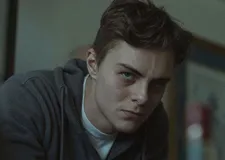 |
| Chris Galust is Vic, driver of a medical van in Milwaukee |
KM: From those ex-partners, we would get eight to ten page notes on every little detail, on a joint, a sail, "can he not bite into … " - my question was: How is it related to the budget? "Everything is related to the budget, Kirill, everything." It was ominous.
AKT: In this film you are going in directions where other filmmakers would be terrified to go. And lots of those. Areas that people are afraid to talk about, where language is dangerous. You include sentences and actions where others would stay far, far away.
AA: Actually those former partners were afraid of all of that. I think they were terrified. We didn't feel that fear because we had this understanding of our common humanity. So that didn't worry us at all. If you don't have that fundamentally and spent a lot of time in places where you're shooting, then of course you have fear.
KM: We're living in an age … It's not just political correctness, this term is already kind of old, it's almost politically incorrect, political correctness. We live in the age - at least in cinema in the United States, I think, on that level - where people want to control. Because they are profoundly afraid of everything and they are wrong people in the wrong business. And they want to create these sterile, cookie-cutter, corporate little things they call indie movies, that are, frankly speaking, unwatchable.
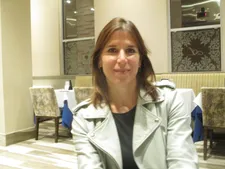 |
| Alice Austen: "I've always had this theory that everything has this surface and then there are these cracks and the cracks are terrifying to people." Photo: Anne-Katrin Titze |
Because these are movies by people who don't know anything about life. They just want to control it. I think they recognized some life or something interesting in this material; they interpreted it absolutely differently. They saw it as a politically correct vehicle, I think. And they wanted to make it even more politically correct by controlling it. I remember there was a point when I said to them "We don't want to make a cookie-cutter movie." And the response was "Kirill, I don't know if you noticed, we don't make cookie-cutter movies."
Of course I was silent. So we kind of sat back and said, okay let them just say whatever they want to say, we just want to make our movie. Actually later someone told Alice, "There was no way you'd make a movie with them. Because it was so obvious that you were just wasting your time." And we played such a diplomatic game with them. And they nearly tanked the movie in October 2017. After having our project hijacked for eight months, basically everything collapsed. Alice and I looked at each other, that was three and a half years after we started that and we were on the brink of disaster.
AKT: I'm so glad you didn't give up.
AA: Thank you. It was hard not to.
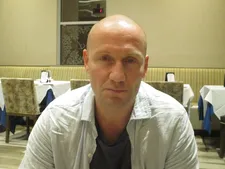 |
| Kirill Mikhanovsky: "Give Me Liberty remains the hidden colour, the hidden palette, if you will, of this movie. It's supposed to feel right and it feels right." Photo: Anne-Katrin Titze |
KM: It was not an option. It was not an option.
AKT: Did you ever read Karl Ove Knausgaard?
AA: Yes!
AKT: I was thinking of some of his descriptions [working at various institutions with people with disabilities].
AA: That's interesting and that's very flattering. He's a brilliant writer, I think, actually. He went in the footsteps of [Alexis] de Tocqueville across America and he wrote a series of essays that were utterly brilliant.
AKT: I know. In the context of your film I was thinking of the descriptions when he was working as a caregiver in various hospitals in book Five of My Struggle. What I thought about while watching your film, was that we are actually always just one step away from this chaos. You are showing what we try so hard to control in life.
AA: It's like the cracks. I've always had this theory that everything has this surface and then there are these cracks and the cracks are terrifying to people. Because we understand what's in the chasm if it opens up a little bit. And I think we let ourselves go into it and go deeper.
AKT: The title Give Me Liberty refers to Patrick Henry and his speech from 1775, used many times after. Was that always your title?
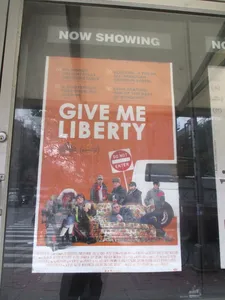 |
| Give Me Liberty poster at the IFC Center in New York Photo: Anne-Katrin Titze |
KM: We didn't have the title for a very long time. In the process of the writing of scenes and simple plots, we're talking about more profound things, philosophising, if you will. Talking about the United States, talking about the concept of the American Dream.
AKT: Who is it for? Who is excluded? Where are the limitations?
KM: Our characters were never going to talk about it, it's just what we were talking about. So one day, two years into the process, we were in a coffee shop seeing a gentleman wearing a rather bright yellow T-shirt with the Statue of Liberty on it, blindfolded. And the T-shirt said Give Me Liberty. Alice saw it first and she drove her elbow into my ribs gently. We both knew immediately. He was a Tunisian mechanic in Milwaukee and he had a heavy hangover. He gave us the T-shirt as a gift. We immediately wrote the T-shirt into the script.
In a later iteration, the T-shirt was gone, but the title stayed. No one ever complained, no one ever asked why about the title. The question why Give Me Liberty was no longer possible to answer until we were at Sundance. At that point the shoe dropped, so to speak. The process of the making of the film and what we see on the big screen mirror each other in an incredible way. In October 2017 we lost everything, we were back to square one, back to square minus two.
AA: They wouldn't answer phone calls, it was a truly terrible moment.
KM: If we walked away from the movie, everyone would have understood. We would have never forgiven ourselves, each other. We would be spiritually bankrupt. To us, it was a clearly to be, or not to be moment. Give Me Liberty or Give Me Death. And we opted for Give Me Liberty. We took it. We took that liberty to make the film. So Give Me Liberty remains the hidden colour, the hidden palette, if you will, of this movie. It's supposed to feel right and it feels right.
 |
| Kirill Mikhanovsky's Coming To You is supported by the Sundance Institute and in post-production at Skywalker Sound. |
AKT: Totally.
KM: And it feels earned. It's a manifest of destiny.
AKT: I like that the title already includes the audience because we know how the quote continues. We add "or give me death". Already you are pushing us into the film.
AA: That's great, yeah.
KM: What's amazing, the French who are so protective of their language kept the same title. And the Russians did the same. And in Russia there is quite a storm of xenophobic moods in the country, in the government and among the people. And there is a very strong anti-American sentiment, fed by the government. Nevertheless, they went ahead and kept it Give Me Liberty. It's transliteration.
AA: It became a sort of beloved film of the intelligentsia in Russia - which is fascinating. Of course, the Gilets Jaunes, they recognise it.
AKT: Vic wears the yellow vest!
AA: It was after we shot the movie.
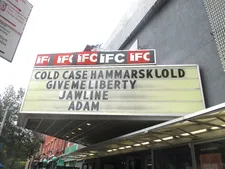 |
| Give Me Liberty on the IFC Center marquee Photo: Anne-Katrin Titze |
AKT: Another coincidence you couldn't anticipate. The moment with the security guard - I think everybody had a similar experience at some point. You talk to someone and all they say is "How can I help you?" And there is no help what so ever involved. "Call the manager on Monday" is the best you get. And then …
KM: … the shift.
AKT: It's such a moment of happiness when we see her [the guard, played by Josette Daniels] celebrating with the others.
AA: She's a woman from the inner city and that's the first acting she's ever done. And this is in Milwaukee, very segregated city. That was the first scene we shot. It was shot amongst a great deal of chaos. We had a substitute makeup artist. She left the paper on so that the tattoo transferred to the paper instead of to the woman's arm. So we were twelve minutes from shooting, and the costumer [Kate Grube] and I drew the tattoo.
AKT: The tattoo is really important in Dima's convincing act.
KM: Dima is a very real character. In the Soviet Union where he grew up - he probably caught the very last breath of the Soviet Union - Russians oftentimes when they deal with officials, they don't take no for an answer. So if the door is locked, they still go through the door. Dima does it as a seducer, as a charmer. He really loves people. He really is the kind of guy who wholeheartedly believes in what he does, whether it's a lie or the truth.
Read what Lolo Spencer had to say on casting people with disabilities and Give Me Liberty.
Give Me Liberty is in cinemas in the US.








